译林牛津初一(上册)英语知识点归纳
译林版牛津英语七年级上册期末复习知识点
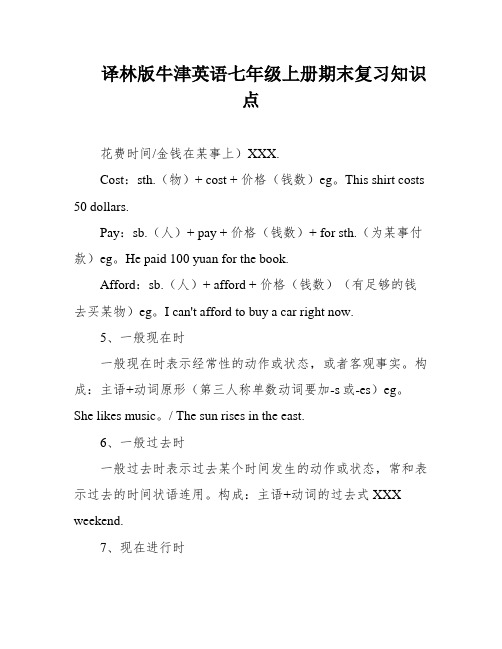
译林版牛津英语七年级上册期末复习知识点花费时间/金钱在某事上)XXX.Cost:sth.(物)+ cost + 价格(钱数)eg。
This shirt costs 50 dollars.Pay:sb.(人)+ pay + 价格(钱数)+ for sth.(为某事付款)eg。
He paid 100 yuan for the book.Afford:sb.(人)+ afford + 价格(钱数)(有足够的钱去买某物)eg。
I can't afford to buy a car right now.5、一般现在时一般现在时表示经常性的动作或状态,或者客观事实。
构成:主语+动词原形(第三人称单数动词要加-s或-es)eg。
She likes music。
/ The sun rises in the east.6、一般过去时一般过去时表示过去某个时间发生的动作或状态,常和表示过去的时间状语连用。
构成:主语+动词的过去式XXX weekend.7、现在进行时现在进行时表示现在正在进行的动作,常和now。
XXX。
currently等时间状语连用。
构成:主语+be动词(am/is/are)+动词-XXX.8、一般将来时一般将来时表示将来某个时间要发生的动作或状态,常和表示将来的时间状语连用。
构成:主语+will/shall+动词原形eg。
I will go to Beijing next month。
/ She shall visit her XXX.9、情态动词情态动词有can/could。
may/might。
must。
shall/should。
will/would。
ought to等。
它们的用法有所不同,但都表示某种语气或情态。
eg。
You should study hard for the exam。
/ She must be at home now.10、被动语态被动语态表示动作的承受者在句子中作主语,动作的执行者在句子中用by引出。
牛津译林版英语七年级上册单元知识点归纳1-4单元
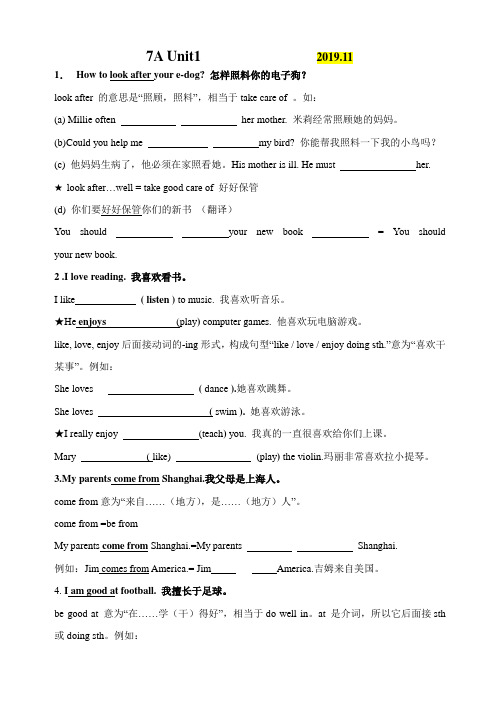
7A Unit1 2019.111.How to look after your e-dog? 怎样照料你的电子狗?look after 的意思是“照顾,照料”,相当于take care of 。
如:(a) Millie often her mother. 米莉经常照顾她的妈妈。
(b)Could you help me my bird? 你能帮我照料一下我的小鸟吗?(c) 他妈妈生病了,他必须在家照看她。
His mother is ill. He must her.★ look after…well = take good care of 好好保管(d) 你们要好好保管你们的新书(翻译)You should your new book = You should your new book.2 .I love reading. 我喜欢看书。
I like ( listen ) to music. 我喜欢听音乐。
★He enjoys(play) computer games. 他喜欢玩电脑游戏。
like, love, enjoy后面接动词的-ing形式,构成句型“like / love / enjoy doing sth.”意为“喜欢干某事”。
例如:She loves ( dance ).她喜欢跳舞。
She loves( swim ).她喜欢游泳。
★I really enjoy (teach) you. 我真的一直很喜欢给你们上课。
Mary ( like) (play) the violin.玛丽非常喜欢拉小提琴。
3.My parents come from Shanghai.我父母是上海人。
come from意为“来自……(地方),是……(地方)人”。
come from =be fromMy parents come from Shanghai.=My parents Shanghai.例如:Jim comes from America.= Jim America.吉姆来自美国。
牛津译林版七年级上英语期末复习全册知识点归纳
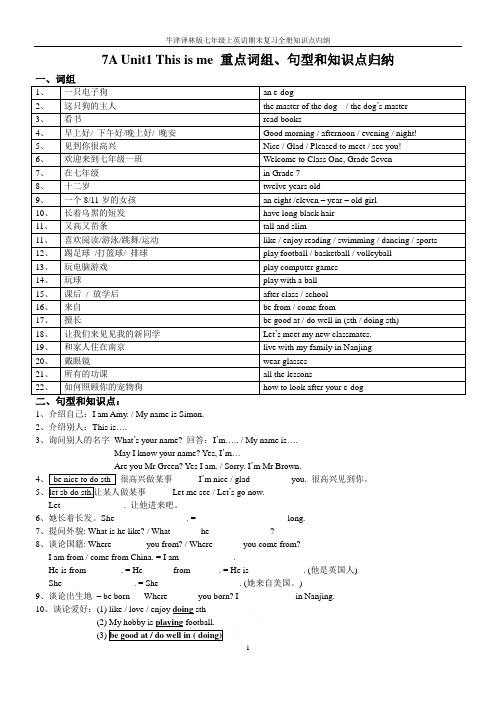
7A Unit1 This is me 重点词组、句型和知识点归纳1、介绍自己:I am Amy. / My name is Simon.2、介绍别人:This is….3、询问别人的名字What’s your name? 回答:I’m….. / My name is….May I know your name? Yes, I’m…Are you Mr Green? Yes I am. / Sorry. I’m Mr Brown.4很高兴做某事I’m nice / glad _________you. 很高兴见到你。
5Let me see / Let’s go now.Let ______________. 让他进来吧。
6、她长着长发。
She _____ _____ _____. = _______ ______ ______ long.7、提问外貌: What is he like? / What ______ he ______ _______?8、谈论国籍: Where _______ you from? / Where ______ you come from?I am from / come from China. = I am ____________.He is from _______ . = He ______ from ______. = He is ____________. (他是英国人)She ________________. = She __________________. (她来自美国。
)9、谈论出生地–10、谈论爱好:She is good at swimming. = She does well in dancing. = She ______ ______.= She is a _____ _______.注意do well in 的否定句例如:他不擅长跳舞。
牛津译林版英语七年级上册分单元知识点归纳总结(Unit1-8))

牛津译林版英语七年级上册全册知识点归纳总结(最新)Unit one一、词汇知识点整理:look after \ take care of 照顾;表示look 的短语:look after照顾look at 看…;look for 寻找look like 看起来像…on the first day 在第一天Class One, Grade Seven (先说班级,再说年级,且大写)。
play football 踢足球after school 放学后be\come from 来自be good at \do well in 擅长fly kites 放风筝go home 回家listen to music 听音乐play a game 玩游戏wear glasses 戴眼镜at school 在学校all the lessons 所有的课程talk about 谈论over there 那里 a lot of hobbies 许多爱好二、结构用法:love\like doing sth 喜欢做某事let’s +动词原形让我们I am\My name is 我叫welcome to +地点欢迎来到This is 这是be good at \do well in doing 擅长做in Class…Grade…在几年级几班be from = come from + 地点, 意思是“来自某地”。
He is from Nanjing. P8 他来自南京。
live with…in…和谁住在哪里live with sb 和某人住一起;live in+ 城市名,住在某地;live on the ground floor 住在一楼(用介词on)I’m …year old. 我几岁了。
year(s) old ,……岁,如果数词大于1,year 要用复数years. 问年龄要用How old “几岁”提问。
例如:- is your sister? --- She is 11. 应填How old.I have (short/long)hair.我留着短(长)头发三、句式用法What’s your name?你叫什么名字?Nice to meet you! 很高兴见到你。
牛津译林版英语七年级上册各单元重点总结

牛津译林版英语七年级上册各单元重点总结Unit 1: Greetings and Introductions- Key phrases: Hello, Hi, Goodbye, Nice to meet you, What's your name?, My name is...- Basic conversation skills: Greeting people, introducing oneself and others- Vocabulary: Greetings, names of people and countriesUnit 2: Classroom Language- Basic classroom instructions: polite ways to ask for permission, give instructions, and perform actions- Vocabulary: Classroom objects, actions, and instructionsUnit 3: Numbers and Colors- Key phrases: How old are you?, What's your favorite color?, It's red.- Basic conversation skills: Asking about age, talking about favorite colors, describing colors- Vocabulary: Numbers, colors, ageUnit 4: My Family- Key phrases: How many people are there in your family?, This is my mother/father/sister/brother.- Basic conversation skills: Talking about family members, describing family relationships- Vocabulary: Family members, possessive pronounsUnit 5: My School- Key phrases: What's your favorite subject?, Do you like...?, Yes, I do. / No, I don't.- Basic conversation skills: Talking about school subjects, expressing likes and dislikes- Vocabulary: School subjects, opinionsUnit 6: My Friends- Key phrases: Who's your best friend?, What does he/she look like?, He/She is...- Basic conversation skills: Talking about friends, describing appearance- Vocabulary: Words to describe people's physical appearanceUnit 7: Free Time Activities- Key phrases: What do you do in your free time?, I like playing football / reading books / listening to music.- Basic conversation skills: Talking about hobbies and free time activities- Vocabulary: Hobbies and leisure activitiesUnit 8: Daily Routines- Key phrases: What time do you get up/go to bed/eat breakfast?, I get up at.../Go to bed at.../Eat breakfast at...- Basic conversation skills: Talking about daily routines and telling the time- Vocabulary: Daily activities, timeUnit 9: Food and Drinks- Key phrases: Do you like...?, Yes, I do. / No, I don't., Can I have some...?, Sure, here you are.- Basic conversation skills: Talking about food preferences, ordering food and drinks- Vocabulary: Food and drinks, likes and dislikesUnit 10: Clothes- Key phrases: What are you wearing?, I'm wearing a T-shirt/trousers/skirt/shoes, etc.- Basic conversation skills: Talking about clothes and describing what someone is wearing- Vocabulary: Clothing itemsUnit 11: Weather- Key phrases: What's the weather like today?, It'ssunny/rainy/cloudy/windy, etc.- Basic conversation skills: Talking about the weather and describing weather conditions- Vocabulary: Weather words and phrasesUnit 12: Holidays and Celebrations- Key phrases: When is...?, It's on..., What do people do on...?, People usually...- Basic conversation skills: Talking about holidays and celebrations, discussing traditions and customs- Vocabulary: Holidays and celebrations, activities以上是牛津译林版英语七年级上册各单元的重点总结,希望对您有所帮助。
Unit1知识点梳理2023-2024学年牛津译林版英语七年级上册

第一讲 7A Unit1 Language Point 梳理一.Unit 1 重点语法1.would like / love sth.想要某物例句:Would you like some water?肯定回答:Yes, please. Yes, I’d like / love to.否定回答:No, thanks.2.would like / love to do sth.想要做某事例句:Would you like to drink some water?肯定回答: Yes, I’d like / love to.否定回答:I’d like / love to, but …… .3.糖葫芦形容词结构:数词+ 名词(单数) + (形容词)例:80foothigh 80 英尺高fiveinchtall 5英寸高的7yearold 7岁的注意:①名词必须用单数②只能放在名词前作定语,不能放在be 动词后作表语。
4.read/look/see/watch几个“看”的用法和区别:look 强调看的动作①系动词。
译作看起来,后接形容词。
She looks happy.②不及物动词。
译作看,词组:look at…,用副词修饰。
Tom looked at me angrily.see 及物动词,译作看到,无进行时态,强调看的结果。
watch 及物动词,译作观看,注视。
强调观看正在进行中的,发生变化的活动过程,常用于看电视、看球赛、看演出等。
read 及物动词,译作阅读。
强调看文字内容的东西,常用于看书、看报纸、看杂志等。
5.疑问代词what、which、who 及疑问副词how、when 、where可以和动词不定式连用。
what to do 做什么which to do 做哪个who to do 如何做how to do 谁做when to do 什么时候做where to do 在哪里做6.“疑问词+ to do” 结构经常放在know,learn,see ,ask等动词后做宾语。
牛津译林版七年级上英语知识点总结
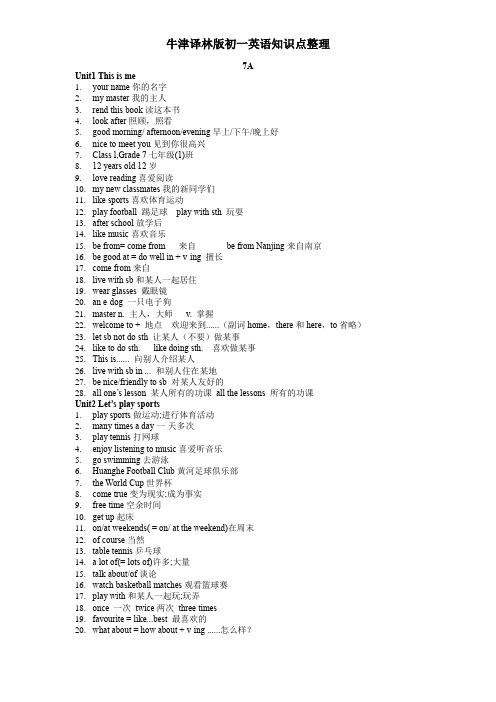
7AUnit1 This is me1.your name你的名字2.my master我的主人3.rend this book读这本书4.look after照顾,照看5.good morning/ afternoon/evening早上/下午/晚上好6.nice to meet you见到你很高兴7.Class l,Grade 7七年级(1)班8.12 years old 12岁9.love reading喜爱阅读10.my new classmates我的新同学们11.like sports喜欢体育运动12.play football 踢足球play with sth 玩耍13.after school放学后14.like music喜欢音乐15.be from= come from 来自be from Nanjing来自南京16.be good at = do well in + v-ing 擅长e from来自18.live with sb和某人一起居住19.wear glasses 戴眼镜20.an e-dog 一只电子狗21.master n. 主人,大师v. 掌握22.welcome to + 地点欢迎来到......(副词home,there和here,to省略)23.let sb not do sth 让某人(不要)做某事24.like to do sth. like doing sth. 喜欢做某事25.This is...... 向别人介绍某人26.live with sb in ... 和别人住在某地27.be nice/friendly to sb 对某人友好的28.all one’s lesson 某人所有的功课all the lessons 所有的功课Unit2 Let’s play sports1.play sports做运动;进行体育活动2.many times a day一-天多次3.play tennis打网球4.enjoy listening to music喜爱听音乐5.go swimming去游泳6.Huanghe Football Club黄河足球俱乐部7.the World Cup世界杯e true变为现实;成为事实9.free time空余时间10.get up起床11.on/at weekends( = on/ at the weekend)在周末12.of course当然13.table tennis乒乓球14. a lot of(= lots of)许多;大量15.talk about/of谈论16.watch basketball matches观看篮球赛17.play with和某人一起玩;玩弄18.once 一次twice两次three times19.favourite = like...best 最喜欢的20.what about = how about + v-ing ......怎么样?21.be a member of = be in 成为......其中的一员22.look +adj look at + adv23.in one’s free/spare time 在某人的空闲时间24.enjoy doing sth 喜欢做某事25.make sb. do sth.使/让某人做某事make sb./sth. + adj.使某人/某物处于.....状态26.want to do sth = would like to do sth 想要做某事27.hope to do sth 希望做某事hope sb will/can do sth 希望某人做某事没有hope sb to do sth28.talk with sb about sth 和某人谈论某事29.fun 不可数名词funny 有趣的have fun +v-ing 做某事玩得愉快30.feel + adj31.reading is fun. 动名词作主语,谓语动词用单数形式。
译林版牛津初中英语七年级上册全册各单元词组、表达方式总结
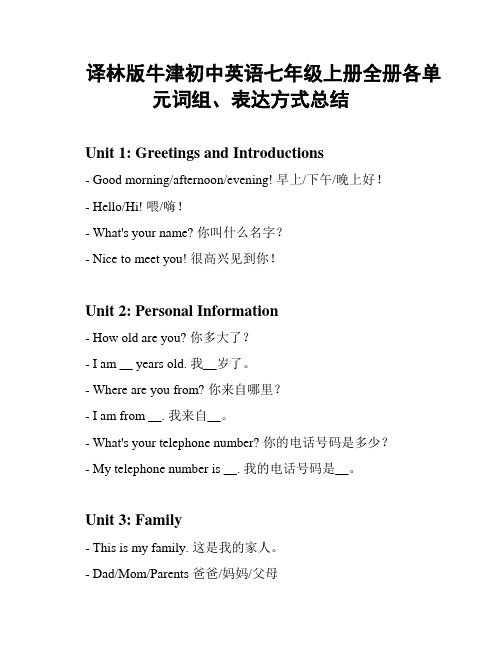
译林版牛津初中英语七年级上册全册各单元词组、表达方式总结Unit 1: Greetings and Introductions- Good morning/afternoon/evening! 早上/下午/晚上好!- Hello/Hi! 喂/嗨!- What's your name? 你叫什么名字?- Nice to meet you! 很高兴见到你!Unit 2: Personal Information- How old are you? 你多大了?- I am __ years old. 我__岁了。
- Where are you from? 你来自哪里?- I am from __. 我来自__。
- What's your telephone number? 你的电话号码是多少?- My telephone number is __. 我的电话号码是__。
Unit 3: Family- This is my family. 这是我的家人。
- Dad/Mom/Parents 爸爸/妈妈/父母- Brother/Sister 兄弟/姐妹- I have __ siblings. 我有__个兄弟姐妹。
- Who is this? 这是谁?Unit 4: School Life- I go to school by __. 我通过__去上学。
- My favorite subject is __. 我最喜欢的科目是__。
- We have __ classes every day. 我们每天有__节课。
- What time do you go to school? 你几点去上学?- I go to school at __. 我__去上学。
Unit 5: Daily Routine- I get up at __. 我__起床。
- I brush my teeth. 我刷牙。
- I have breakfast/lunch/dinner. 我吃早饭/午饭/晚饭。
- 1、下载文档前请自行甄别文档内容的完整性,平台不提供额外的编辑、内容补充、找答案等附加服务。
- 2、"仅部分预览"的文档,不可在线预览部分如存在完整性等问题,可反馈申请退款(可完整预览的文档不适用该条件!)。
- 3、如文档侵犯您的权益,请联系客服反馈,我们会尽快为您处理(人工客服工作时间:9:00-18:30)。
初一英语Unit 1 This is me!短语归纳:look after \ take care of 照顾 on the first day 在第一天Class 1,Grade 7 7年级1班 play football 踢足球after school 放学后 be\come from 来自be good at \do well in 擅长 fly kite s 放风筝go home 回家 listen to music 听音乐play a game 玩游戏 wear glasses 戴眼镜at school 在学校 all the lessons 所有的课程talk about 谈论 over there 那里a lot of hobbies 许多爱好用法集萃:love\like doing sth 喜欢做某事 let’s +动词原形让我们I am\My name is 我叫 welcome to +地点欢迎来到This is 这是 be good at \do well in doing 擅长做in Class…Grade…在几年级几班 live with…in…和谁住在哪里I’m …year old. 我几岁了。
I have…hair.我留着……头发典句背诵What’s your name?你叫什么名字?Nice to meet you! 很高兴见到你。
I love reading. 我喜欢阅读Now let’s meet our new classmates. 现在让我们认识下我们的新同学。
I often play football after school.放学后我经常踢足球。
She is tall and slim. 她个头很高,身材苗条。
He is from Nanjing. 他来自。
He is good at Maths. 他擅长于数学。
Millie is 11 years old.米莉11岁。
They are all very nice.他们都很好。
I am good at dancing. 我擅长于跳舞。
语法:连系动词be 的一般现在时动词be 的三变化 am is are. 我(I)用am ,你(you)用are ,is 用于他(he)她(she)它(it),单数名词用is,复数名词都用are句型结构:1、肯定句:主语+am\is\are … It is a football.2、否定句:主语+am\is\are+not… It is not a football.3、一般疑问句:Am\Is\Are+主语+其他?Is it a football? 回答 Yes, it is. No, it isn’t4、特殊疑问句:疑问句+am/is/are +主语+其他?What’s your name?Unit 2 Let's play sports!短语归纳:play sports 做运动 many times a day 一天许多次play football/tennis 踢足球/打网球 talk about 谈论after school 放学后 go swimming 去游泳a member of …中的一员 come from 来自listen to music 听音乐 in the next World Cup 在下届世界杯come true 实现 in one’s free time 在某人的空闲时间live in 住/生活在 read books 看书at/ on weekends=at/on the weekend在周末stay at home 待在家里 a lot of 许多ask sb about sth 问某人某事 on TV 在电视上Watch basketball matches 看篮球比赛 feel great 感觉特棒用法集萃:What about doing sth ?做…怎么样?Enjoy doing sth 喜欢做某事make sb/sth +adj 使某人/某物 make sb to do sth 使某人做某事want to do sth 想要做某事 hope to do sth 希望做某事have fun doing sth 做某事开心典句必背I like walking. 我喜欢散步。
I enjoy swimming.What’s your favourite sport? 我喜欢游泳,他最喜欢的运动是什么?I hope his dream comes true. 我希望他梦想成真。
What does Li Hua do in his free time? 华在业余时间做什么?What else do you want to do? 你还想做什么其他的事情?Reading is fun. 读书是有趣的事情。
语法:行为动词的一般现在时行为动词的一般现在时的构成:主语+行为动词+(其他)当主语为第三人称单数(he, she, it)时,谓语动词也要用单数形式。
用好一般现在时,时间状态需牢记;主语人称是三单,动词要把-s/-es 添;基本用法要记清,状态习惯经常性。
行为动词的一般现在时的变化(1)否定句:主语+ don’t/doesn’t + 动词原形+其他I don’t like bread.He doesn’t often play football.(2)一般疑问句:Do/Does + 主语+动词原形+其他Do you often play football? Yes, I am /No, I am notDoes he often play football? Yes, he does/ No, he doesn’t3、特殊疑问句:特殊疑问句+一般疑问句?When do you go to school? I go to school at seven o’clock.动词的三单形式的变化:动词三单现在时,一般在词尾加SS,x,ch,sh,在词尾,直接加上-es词尾若是字母o ,加上-es 不用愁。
词尾是“辅音字母+y” ,先变y为i, 后边再加-esUnit 3 Welcome to our school!短语归纳:on foot 步行 far away from 远离a few 一些,少量 learn about 学得,获知would like sth/to do sth 想要/想要做某事 after class 下课后on this day 在今天 all kinds of 各种各样on the phone 在中 look at 看ground floor 底层,一楼 on the wall 在墙上by bus 乘公共汽车 in front of 在……前面let me see 让我看看 go to school 去上学reading room 阅览室 borrow from 从……借……get to school 到达学校 on the Open Day 在开放日用法集萃:Thank you for doing sth 为做某事而感你be ready to do sth 准备做某事It takes sb some time to do sth 花费某人多少时间做某事show sb around 领某人参观need to do sth 需要做某事典句必背:Welcome to our school.欢迎来到我们学校。
What’s the date taday?今天几月几号Let’s meet at the school gate at 1:30.让我们1:30 在学校门口会面吧Who’s that man in the white shirt?穿白衬衫的那个男的是谁?There are all kinds of books in our library.在我们图书馆有各种各样的书I’d like to say hello to her.我想向她问好。
Do you borrow books from the library?你从图书馆借书吗?We only have a few classrooms.我们只有几间教室It takes me about an hour to get to school.大约花了我一个小时的时间到达学校。
语法:一、人称代词人称代词主格:作主语,表示谁怎么样了、干什么了。
I am a teacher. You are student. He is a student, too.We/You/They are students.人称代词宾格作宾语,表示动作行为的对象。
Give it to me. Let’s go (let’s =let us)二、物主代词表示所有关系的代词叫做物主代词,也可叫做代词所有格。
物主代词分形容词性物主代词和名词性物主代词二种,其人称和数的变化见下表。
形容词性物主代词(my/your/his/her/its/our/their)+名词而名词性物主代词则相单于形容词性物主代词+名词,故其后不必加名词。
如:Is this your book? No,,it isn’t,it’s hers(her book)This pen is mine.人称代词的顺序单数的人称代词为第二人称,第三人称,第一人称(2,3,1)复数的人称代词为第一人称,第二人称,第三人称(1,2,3)Unit 4 My day短语归纳:Wake sb up 叫醒某人 go out 出去,熄灭have breakfast/lunch/dinner 吃早中晚饭 have fun 玩的开心get up 起床 have lessons 上课go to bed 去睡觉 be late for 迟到chat with 聊天 each other 相互have a good time 玩的开心 all the best 一切顺利,万事如意get ready for为……准备好 need a good rest 需要好好休息do morning exercise s用法集萃It is time for sth/ to do sth 到该做什么的时间到了。
have fun doing sth 高兴地做某事how to have fun 如何玩得高兴wish our team good luck.祝愿我们队好运。
have too much homework.有太多的家庭作业典句背诵:Some dogs just don’t know how to have fun.I’m never late for school.After class, we often chat with each other or play in the playground.下课后,我们经常在一起聊天或者在操场上玩We practice after school on Wednesday afternoon.周三下午放学后我们一起训练Best wishes 美好的祝愿语法:用in一般在“上”“下”“晚”,还有时间,年、月、季;On 指特定的某一天,日期,星期和季节At 用在时刻前,还有正午,午夜连频率副词从频率最大到频率最小依次为:always, usually, often, sometimes, seldom, never.对频率副词提问要用how oftenUnit 5 Let's celebrate !短语归纳:dress up 装扮成 a list of sth 一……清单the Chinese New Year 中国新年 the Dragon Boat Festival 端午节thanksgiving Day 感恩节 the Mid-Autumn Festival 中秋节at Christmas 在圣诞节 have a party 举行聚会have a big lunch 吃一顿丰盛的晚餐 in the USA 在美国like …best 喜欢 on October 31 在10月31号pumpkin lantern 南瓜灯 knock on 敲play a trick on sb 捉弄某人 out of 用……(材料)on Halloween 在万圣节前夕 give sb sth as a treat 用某物招待某人have…for lunch 中饭吃…… lion dance 狮子舞find out 找出,查明,发现,了解 around the world 世界各地,全世界let off fireworks 燃烧烟花 ask for 请求询问on holiday 度假 seem very happy 好像很开心用法集萃Let sb do sth 让某人做某事 how about doing sth ?做什么怎么样?paint +宾语+颜色把什么涂成什么颜色 give sb sth =give sth to sb 给某人某物典句背诵What a nice cake?Have a nice day!I would like the red one.我想要这个红色的。
